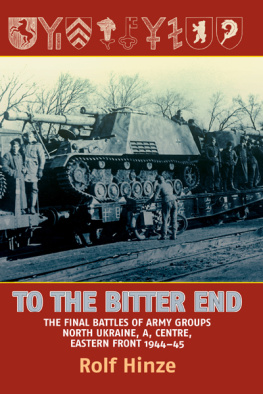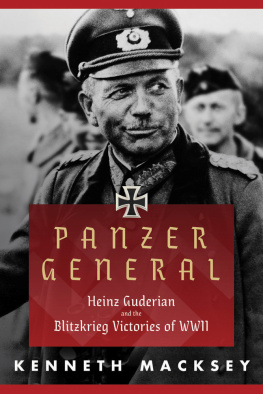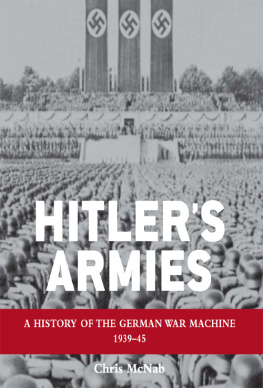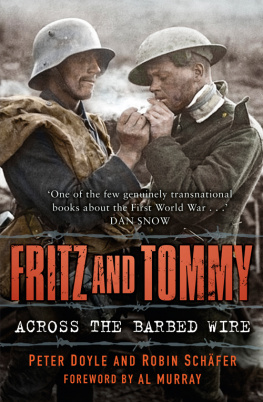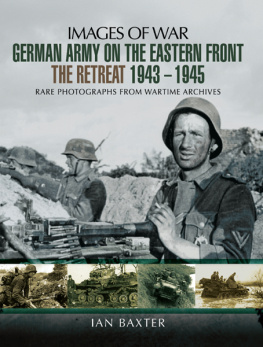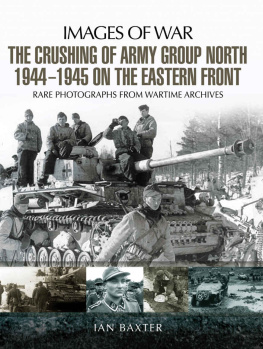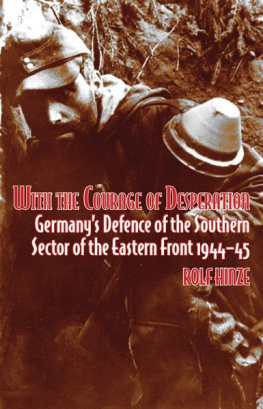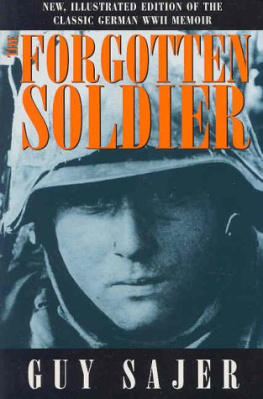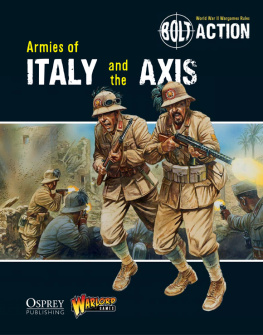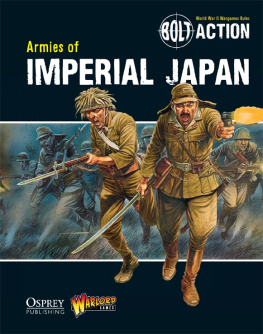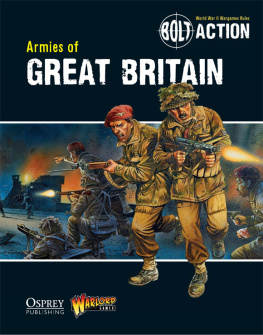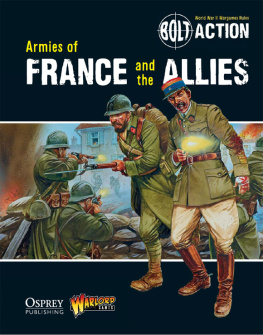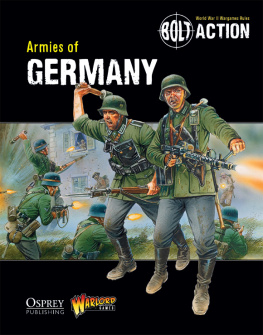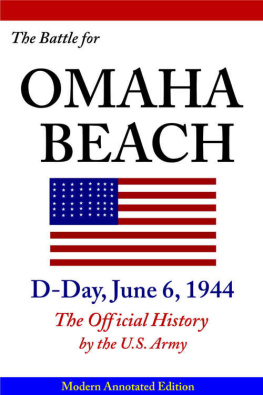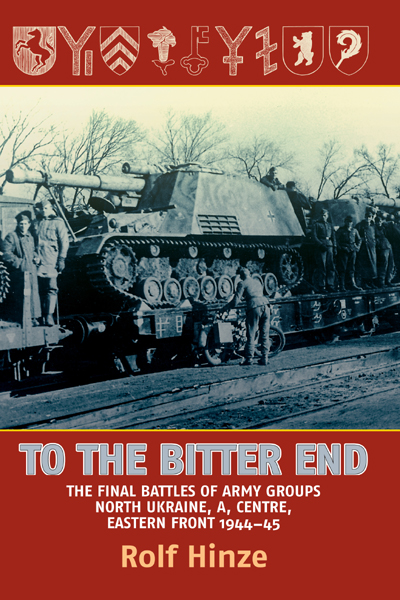
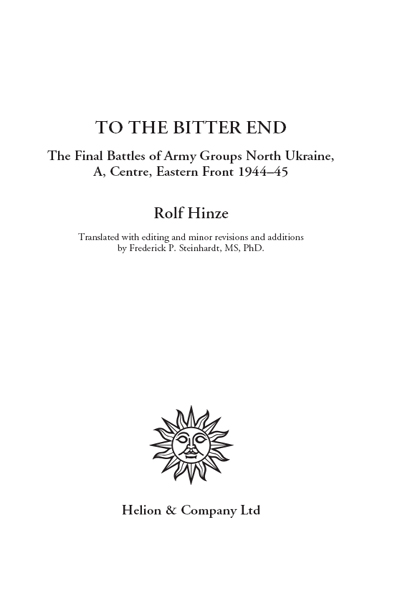
Dedicated to all the members of the Army and the Volkssturm who gave their lives defending the German homeland from the enemys grasp.
Helion & Company Limited
26 Willow Road
Solihull
West Midlands
B91 1UE
England
Tel. 0121 705 3393
Fax 0121 711 4075
Email: publishing@helion.co.uk
Website: www.helion.co.uk
Published by Helion & Company 2005
Designed and typeset by Helion & Company Limited, Solihull, West Midlands Cover designed by Bookcraft Limited, Stroud, Gloucestershire Printed by Cromwell Press Ltd, Trowbridge, Wiltshire
This English edition Helion & Company Limited 2005. Translated with editing and minor revisions and additions by Frederick P. Steinhardt, MS, PhD.
Originally published as: Letztes Aufgebot zur Verteidigung des Reichsgebiets. Kmpfe der Heeresgruppe Nordukraine/A/Mitte . German edition Verlag Dr Rolf Hinze 1995. All rights reserved.
Checking by: Fritz Brandenburg, Dr Hella Hinze, Gerd Zimmermann.
Maps by Hans-Jrgen Thies
Photographs History in the Making Archive
Hardcover ISBN 9781874622369
Digital ISBN 9781907677281
British Library Cataloguing-in-Publication Data.
A catalogue record for this book is available from the British Library.
All rights reserved. No part of this publication may be reproduced, stored in a retrieval system, or transmitted, in any form, or by any means, electronic, mechanical, photocopying, recording or otherwise, without the express written consent of Helion & Company Limited.
For details of other military history titles published by Helion & Company Limited contact the above address, or visit our website: www.helion.co.uk.
We always welcome receiving book proposals from prospective authors.
List of Maps
Publishers Note
T he English edition of this book would not have been possible to produce without the help of a number of people.
First and foremost, the publishers would respectfully like to dedicate this book to its translator, Mr Frederick Steinhardt. Fred went well beyond the call of duty in terms of the input and the effort he put into his translation work. He was always available to answer any questions we had. Unfortunately, very shortly before this book went to print, Hurricane Katrina hit New Orleans where Fred lived. Fred was safe. However, in the subsequent upheaval he was unable to carry out a final check of the text. Readers should therefore note that any mistakes or errors are the responsibility of Helion, and not the translator.
I would also like to thank Ian Baxter, at History in the Making, who responded at very short notice to our request for photographs. I think readers will agree that the selection he came up with adds a great deal to this book.
Finally, I would like to thank our copy editors, Richard and Gwyneth Fairbank, for their contribution.
Duncan Rogers
Helion & Company Ltd
Foreword
H istory consists of what has happened. One must not forget that the present is built upon the events of the past. It is acknowledged that unreserved recognition is not always given to negative events, since too many factors affect humanity. Only thus can an explanation be found for the fact that negative phenomena in the history of a people, or a state, are occasionally repeated. Nevertheless, such phenomena permit certain conclusions that are only possible if one has knowledge of the events. Thus, it is necessary to record what happened, so that a conclusion can later be drawn from past events.
The manner of presentation must permit the formation of logical conclusions. It seems obvious that events should be presented as they happened, and as they were perceived at the time. Indeed, one must see what knowledge those participants might have had, at the time, that served as a basis for their action, or their inaction.
As the decades have passed, people have constantly gained new knowledge and new viewpoints. Therefore it is clearly extremely difficult to present events objectively, without tinting them through a personally motivated world view, or by becoming judgmental. Those difficulties apply especially to World War II, since the victorious powers released a counter-wave of propaganda, specifically through their re-education programme in their efforts to erase the Nazis propaganda. In turn, that was based on the necessarily subjective propaganda put out during the war. The various hostile sides in a war almost inevitably develop their own propaganda.
Re-educationtook place in all areas of educationin Germany, particularly in the schools, the education of teachers, and in the media. It seemed as if the German people would have to wear hair-shirts for decades, even though the individual might bear no personal guilt. There was much talk of collective moral guilt.
If that were to be applied to all peoples, then today the citizens of the former USSR would have to bear the moral guilt for the destruction of millions of people in the forced labour camps of the Soviet Gulag. Guilt would be assigned in exactly the same way as for the mass killings in the German concentration camps, some might say much more so, because of their extent. The citizens of the former USSR knew what happened to their family members in the various Stalinist purges. It cannot be asserted to the same extent regarding what German citizens knew of the horrors of the concentration camps.
In addition came the many trials at the hands of the victors, such as the Nuremberg Trials. They were to provide the basis for future judgement, by international law, of measures occurring within and between states, even with retroactive effect. Such a basis could have had a positive effect for the future development of relationships between nations. Later, it could have been applied to all peoples, and all statesmen and military personnel. Consider, however, that since 1945 there have already been more than 150 wars, and never has anyone been held responsible for their origins.
Basic principles that are only applied to a very specifically defined group of people, but not to all, cannot provide the basis for fundamental principles of law, but necessarily give the impression of measures of revenge, taken by the victors, under the cloak of justice. The phrase Vae victis , i.e. woe to the vanquished, ruled the process of law in Europe after the Second World War. One has only to look at the camps in which German civilians were confined in the Soviet zone of occupation, and the forced labour camps in which German prisoners of war were confined after the surrender. The British and Americans delivered people to the Russians, with subsequent 10 or 11 year terms of forced labour, and massive loss of life. Further back, one thinks of the time of the Russian Revolution, and the serial shootings of former emigrants, of members of the Vlassov Army, of Cossacks, Turkestanis and other peoples of the USSR who were repatriated to Russia by the British.
For decades, nothing was said of the atrocities perpetrated by the Red Army and Soviet partisans, upon German wounded especially, and workers in the rear areas. The highest courts and authorities of Britain, including Churchill and Eden, took the position that one had to maintain good relations with the Soviet Union because of the terms of the future peace. After the First World War, in contrast with their previous motivation of commitment of invasion forces to fight against the Red Army, they then professed to see the USSR as a constitutional state, and Stalin turning into a democrat.

